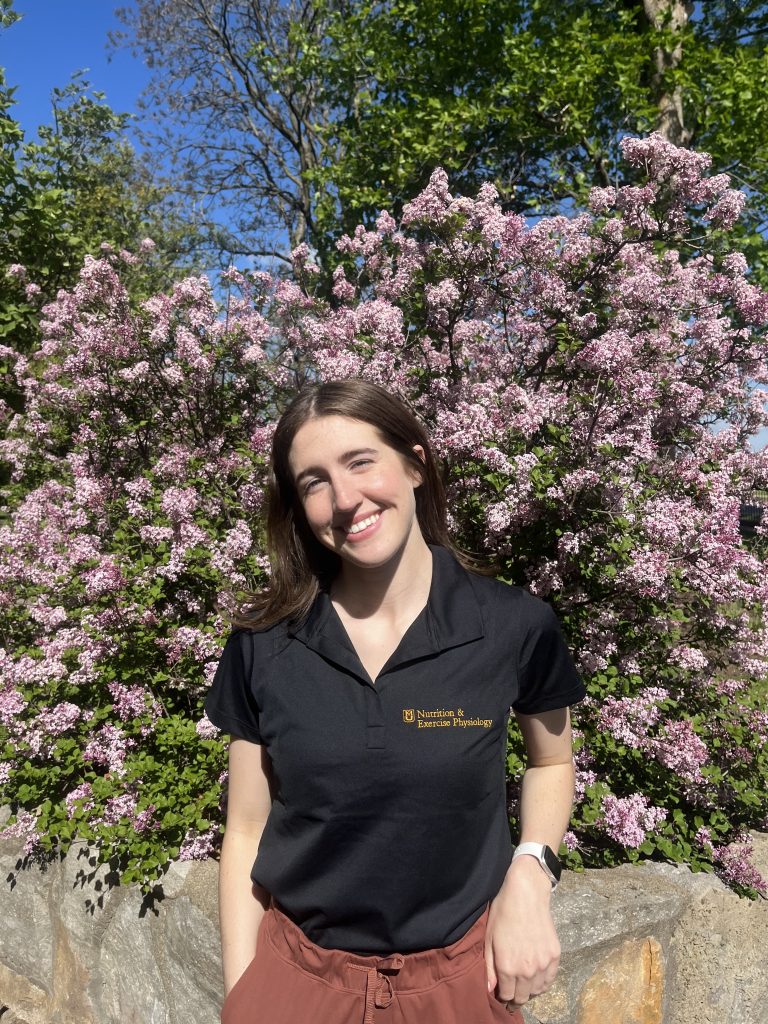
When it came time for Anna Gonsalves to choose her path in higher education, she was motivated by curiosity. While she began her freshman year of college at Missouri S&T as an engineering student, she quickly discovered that it didn’t satisfy that curiosity enough.
“I didn’t want to be hands on fixing problems; I wanted to find out what caused the problems in the first place,” said Gonsalves.
Gonsalves transferred to Mizzou in August of 2020, and chose biochemistry because it combined two of her scientific interests and provided her a variety of opportunities.
“I like how you could take biochemical knowledge anywhere; it’s so foundational,” said Gonsalves.
The biochemistry program also allowed Gonsalves to explore other scientific interests within CAFNR. During her junior year, Gonsalves took that foundational knowledge into Jacqueline Limberg’s nutrition and exercise physiology lab as an undergraduate researcher.
“I was always interested in higher education,” said Gonsalves. “I have always liked answering questions, getting into something really niche and studying it a lot. I’ve always been a passionate learner, like kind of a nerd. I listen to TED Talks in my free time. So I joined a research lab, not even thinking that this is what I wanted to do for the rest of my life, but it was such a perfect fit. I just struck gold with the topics Dr. Limberg’s lab researched and the mentorship available to me there.”
As an undergraduate researcher, Gonsalves worked her way up in the lab, helping on a variety of NEP projects with human trials, most of them related to nervous system control of blood flow. As a senior, she helped create and present a poster on the effects of high insulin on brain blood flow. Gonsalves credits her early exposure to biochemistry coursework for her ability to move up in the lab as quickly as she did.
“Because I took Biochemistry 4270 early than most other students, I was able to understand a lot of the biochemical mechanisms used in the lab a lot faster,” said Gonsalves. “It was super helpful, especially because the lab was doing human research. The practical application from the lab also helped me to have context for some of the things we discussed in my biochemistry classes as well, like cholesterol, because I could conceptualize it from my experience with real human participants in the lab.”
When Gonsalves was looking at PhD programs that involved human research in nutrition and exercise physiology, she interviewed at Saint Louis University with a professor that knew Limberg.
“The world of physiology is very niche, everyone kind of knows each other,” she said. “During my interview in St. Louis one of the faculty said that they would love to have me, but asked me why I wanted to leave Mizzou when I was already in such a great lab with such a great mentor. That was my sign to take the offer from Mizzou, because she was right, I do have it so great here. Dr. Limberg is a great representation of the department as a whole and their great reputation for fostering undergraduate students into higher education.”
Currently, Gonsalves is working on a project that studies blood flow and vascular changes as women age, which will likely become her dissertation. Post-PhD, she is open to many career opportunities, including a faculty position at a university or exploring science communications in health fields, another passion that was ignited by her undergraduate research experience.
“Undergraduate research gave me so many opportunities for writing, interacting with participants, interpersonal skills, and even public speaking skills,” she said. “Being able to know niche details, to know your project intimately, and to be able to summarize that for a lay audience is such a great translational skill that you can apply to so many career opportunities. Research is also a great way to learn self-discipline and contribute to something bigger than yourself, which is extremely rewarding.”